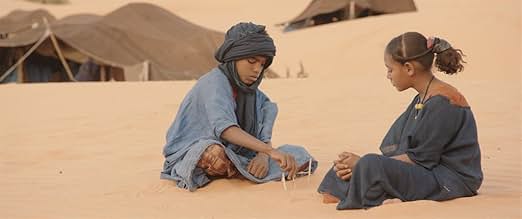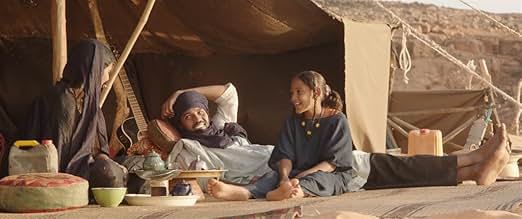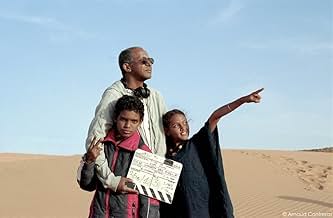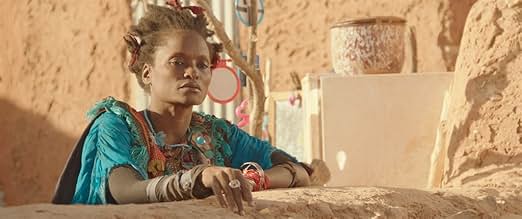Timbuktu
- 2014
- Tous publics
- 1h 36min
NOTE IMDb
7,1/10
19 k
MA NOTE
Près de Tombouctou au Mali, un éleveur vit dans le désert avec sa femme et sa fille. Leur vie va être bouleversée par l'arrivée d'islamistes radicaux qui imposent la charia.Près de Tombouctou au Mali, un éleveur vit dans le désert avec sa femme et sa fille. Leur vie va être bouleversée par l'arrivée d'islamistes radicaux qui imposent la charia.Près de Tombouctou au Mali, un éleveur vit dans le désert avec sa femme et sa fille. Leur vie va être bouleversée par l'arrivée d'islamistes radicaux qui imposent la charia.
- Réalisation
- Scénario
- Casting principal
- Nommé pour 1 Oscar
- 33 victoires et 28 nominations au total
Ibrahim Ahmed
- Kidane
- (as Ibrahim Ahmed dit Pino)
Yoro Diakité
- Djihadiste
- (as Yoro Diakite)
Weli Kleïb
- Juge
- (as Weli Cleib)
Avis à la une
"Timbuktu" (2014 release from Mauritania; 99 min.) brings the story (fictional, by influenced by real events) of how the Mali town copes with the 'liberation' by jihadis. As the movie opens, we see the jihadis having a shooting practice by destroying the local wood statutes. The jihadis issue all kinds of rules ("smoking is forbidden! music is forbidden!"), much to the irritation of the local Mali population. We get to know one local family in particular, a husband and wife with their 12 yr. old daughter. They live a bit outside of the city center where the desert takes over, going about their daily business as best as possible. Then one day, one of the husband's cow accidentally destroys the fishing nets of the fisherman, who promptly kills the cow. The husband decides that he cannot tolerate this. To tell you more would spoil your viewing experience, you'll just have to see for yourself how it all plays out.
Couple of comments: first, it is a small miracle that a movie like "Timbuktu" could even have been made. Writer-director Abderrahmane Sissako shot the movie in Mauritania, which subs for Mali, but let's not kid ourselves. Mauritania is an "Islamic Republic", so it was no easy feat to shoot there either. Second, Sissako demonstrates again and again how much the local population resends the jihadis for uprooting their lives. There are several scenes in which a local man pleads with the jihadis ("where is forgiveness? where is leniency?"), to no avail of course. Playing soccer will cost you 20 leashes. Playing music comes at 40 lashes. Being in the room with someone from the opposite sex is another 40 lashes, and on and on. The fact that the neither side can understand the other (they speak Tamasheq in Timbuktu, the jihadis mostly speak Arabian, some also speak French or English) only makes the entire situation even more absurd. Second, while there are some shocking scenes in the movie, overall this is not a violent or graphic film. Almost on the contrary, in that the movie's editing and photography is done in such a way that it induces a false sense of peace and security. The photography in particular is pure eye-candy. Third, I have no idea where Sissako found these performers, but there are some wonderful performances, in particular from the wife and the 12 yr. old daughter. Bottom line: there is a good reason why this film is nominated for the Best Foreign Language Oscar, as it is a deeply moving film that will stay with you long after you have seen it.
The movie finally opened this weekend at my local art-house theater here in Cincinnati, and I went to see it right away. The matinée screening where I saw this at today was attended okay but not great, although I'm hoping that the bitter cold weather is a factor for that. If you like a top-notch foreign film that provides a glimpse of what real life under jihad is like, you cannot go wrong with this. "Timbuktu" is HIGHLY RECOMMENDED!
Couple of comments: first, it is a small miracle that a movie like "Timbuktu" could even have been made. Writer-director Abderrahmane Sissako shot the movie in Mauritania, which subs for Mali, but let's not kid ourselves. Mauritania is an "Islamic Republic", so it was no easy feat to shoot there either. Second, Sissako demonstrates again and again how much the local population resends the jihadis for uprooting their lives. There are several scenes in which a local man pleads with the jihadis ("where is forgiveness? where is leniency?"), to no avail of course. Playing soccer will cost you 20 leashes. Playing music comes at 40 lashes. Being in the room with someone from the opposite sex is another 40 lashes, and on and on. The fact that the neither side can understand the other (they speak Tamasheq in Timbuktu, the jihadis mostly speak Arabian, some also speak French or English) only makes the entire situation even more absurd. Second, while there are some shocking scenes in the movie, overall this is not a violent or graphic film. Almost on the contrary, in that the movie's editing and photography is done in such a way that it induces a false sense of peace and security. The photography in particular is pure eye-candy. Third, I have no idea where Sissako found these performers, but there are some wonderful performances, in particular from the wife and the 12 yr. old daughter. Bottom line: there is a good reason why this film is nominated for the Best Foreign Language Oscar, as it is a deeply moving film that will stay with you long after you have seen it.
The movie finally opened this weekend at my local art-house theater here in Cincinnati, and I went to see it right away. The matinée screening where I saw this at today was attended okay but not great, although I'm hoping that the bitter cold weather is a factor for that. If you like a top-notch foreign film that provides a glimpse of what real life under jihad is like, you cannot go wrong with this. "Timbuktu" is HIGHLY RECOMMENDED!
One of the movies that's still in the running for a "Best Foreign Language Film" Oscar nomination, is Timbuktu. Together with the Estonian Mandariinid it's one of my favorites for this year's Academy Awards, but I'm afraid only one of them will make it to the shortlist and neither of them will eventually win the Oscar. Not while movies like Ida, Turist and Leviathan are their competitors (although I think Timbuktu and Mandariinid are better than those three). The thing about Timbuktu that makes it such a beautiful picture, is its, what I presume, authentic representation of Muslims and the different views on Islamic religion. Spoken in a number of languages, from French and English to Arabic and a wide diversity of African languages (Tamasheq, Bambara and Songhay), Timbuktu shows Westerners a part of the world we almost know nothing about. Apart from judgemental and arrogant claims about the (religious) backwardness of many people there, be they Berber or Bedouin, many people here just don't know what to say about the Northern part of Africa. Director Abderrahmane Sissako gives us lots of stuff to talk and think about (for example the use of "jihad" as on the one hand an inner struggle (the greater jihad) and on the other hand an external holy war which is fought by mujahideen - the second jihad being the one we fear and loathe so much in the West). Not only that, but together with his cinematographer Sofian El Fani (La Vie d'Adèle) he manages to provide us with wonderful visual poetry and exceptional sceneries of south-east Mauritania. While it took some getting used to the narrative and the editing, I was full of awe after enjoying this utterly majestic work of art. Highly recommended!
At the end of Woody Allen's Bananas, the leader of the successful Latin American revolution starts making crazed pronouncements: "The official language of the country will be Swedish! Everyone must change their underwear every day, and wear it on the outside so we can check!" That's kind of what happens when the jihadists come to town in Timbuktu, only its tragic, not funny. A bunch of mostly foreigners with AK-47s show up in a Muslim community, tell all the locals they're not Muslim enough, and oh, by the way, use the Qaran to justify taking anything they feel like taking, including marriageable young women. You come away with a sense of what it feels like for ordinary people to live through this, and it's not pretty at all.
A film about the daily reality of Islam fundamentalism is a courageous project - even more so when the maker himself is a Muslim. For this reason alone, 'Timbuktu' cannot be praised enough. It will get plenty of international exposure, because this film is the first ever Oscar entry from Mauritania, and luckily it made the Foreign Language shortlist of nine candidates, out of 83 entries.
'Timbuktu' shows how Libyan jihadists invade Mali and turn the lives of the locals upside down. The Malinese are no longer allowed to play music or to smoke cigarettes, the women are obliged to cover their heads when in public, and sharia courts are issuing cruel and undeserved punishments. In spite of all this, the film is not at all harsh or bleak. On the contrary, most scenes show the Malinese living an idyllic life and trying to make the best of the situation. Some scenes are almost hilarious: the jihadists have to cope with serious language barriers to get their message across, they are unable to drive cars and even break their own rules by secretly smoking cigarettes.
Filmed in neighbouring Mauritania, the movie is full of beautiful landscapes, nice buildings and good-looking people. This is exactly what bothered me a little bit: sometimes you have the impression that you're watching a documentary on National Geographic Channel, showing the beauty of Mali. I can't imagine life in this dirt poor country being even half as peaceful and harmonious as is suggested in this film. A little more third world realism would have been appropriate, including the daily struggle for life of people living in extreme poverty.
Nevertheless, the film is a joy to watch, and contains some extremely beautiful scenes. One example is the scene of a football team playing a game without a ball, because it is confiscated by the jihadists. A perfect and original way to show how Muslim fundamentalism can be defeated, against all odds.
'Timbuktu' shows how Libyan jihadists invade Mali and turn the lives of the locals upside down. The Malinese are no longer allowed to play music or to smoke cigarettes, the women are obliged to cover their heads when in public, and sharia courts are issuing cruel and undeserved punishments. In spite of all this, the film is not at all harsh or bleak. On the contrary, most scenes show the Malinese living an idyllic life and trying to make the best of the situation. Some scenes are almost hilarious: the jihadists have to cope with serious language barriers to get their message across, they are unable to drive cars and even break their own rules by secretly smoking cigarettes.
Filmed in neighbouring Mauritania, the movie is full of beautiful landscapes, nice buildings and good-looking people. This is exactly what bothered me a little bit: sometimes you have the impression that you're watching a documentary on National Geographic Channel, showing the beauty of Mali. I can't imagine life in this dirt poor country being even half as peaceful and harmonious as is suggested in this film. A little more third world realism would have been appropriate, including the daily struggle for life of people living in extreme poverty.
Nevertheless, the film is a joy to watch, and contains some extremely beautiful scenes. One example is the scene of a football team playing a game without a ball, because it is confiscated by the jihadists. A perfect and original way to show how Muslim fundamentalism can be defeated, against all odds.
I don't believe there is one frame in this film that is not gorgeous, that couldn't be displayed as a photograph at a gallery. The muted colors of the desert, the medieval architecture of the town, the tragically expressive faces always glowing in a magical light--all of it is almost painfully beautiful. The story is beyond tragic. By seemingly digressing into numerous anecdotes illustrating the quirks of the population, the director allows us to appreciate deeply the texture and social fabric of the community that is being poisoned by madness. We see in particular its effect on an extremely appealing but by no means sanctified family. This is one of the film's extraordinary strengths as well. No character is oversimplified; even the appalling jihadists are granted their humanity. I've seen "Boyhood" and "Birdman", the apparent favorites for the Oscar. "Timbuktu" utterly blows both those fine movies out of the water.
Le saviez-vous
- AnecdotesThe scene in which the cow was killed with a spear was done by sedating the cow under the supervision of a veterinarian and adding the spear digitally in post production - the animal was not harmed.
- GaffesIn the stoning scene, both man and woman are buried up to their necks. In a proper Islamic stoning (rajm), the woman should only be buried up to her waist.
- ConnexionsFeatured in The Oscars (2015)
- Bandes originalesShooting The Statues
Composed, Arranged and Orchestrated By Amin Bouhafa
with The City of Prague Philharmonic Orchestra
© 2014 Universal Music France
Meilleurs choix
Connectez-vous pour évaluer et suivre la liste de favoris afin de recevoir des recommandations personnalisées
- How long is Timbuktu?Alimenté par Alexa
Détails
- Date de sortie
- Pays d’origine
- Sites officiels
- Langues
- Aussi connu sous le nom de
- Le chagrin des oiseaux
- Lieux de tournage
- Oualata, Mauritanie(as Timbuktu)
- Sociétés de production
- Voir plus de crédits d'entreprise sur IMDbPro
Box-office
- Montant brut aux États-Unis et au Canada
- 1 076 075 $US
- Week-end de sortie aux États-Unis et au Canada
- 45 110 $US
- 1 févr. 2015
- Montant brut mondial
- 7 179 391 $US
- Durée1 heure 36 minutes
- Couleur
- Rapport de forme
- 2.35 : 1
Contribuer à cette page
Suggérer une modification ou ajouter du contenu manquant



























